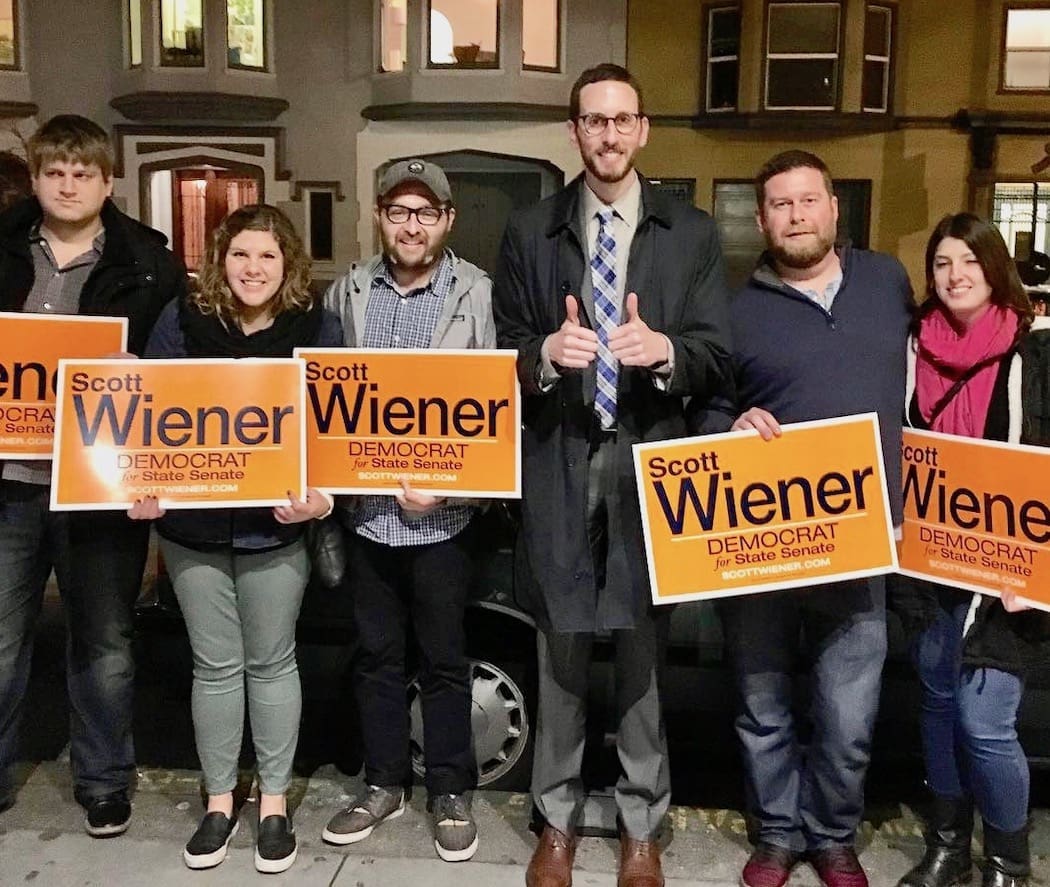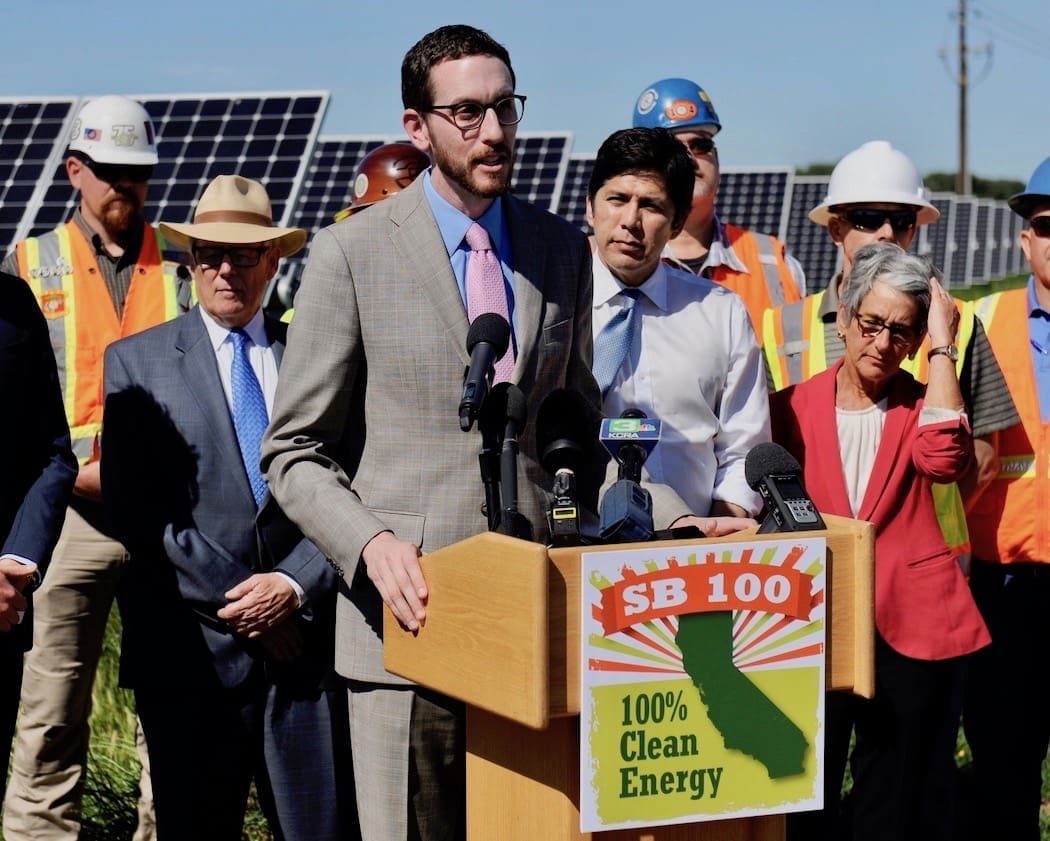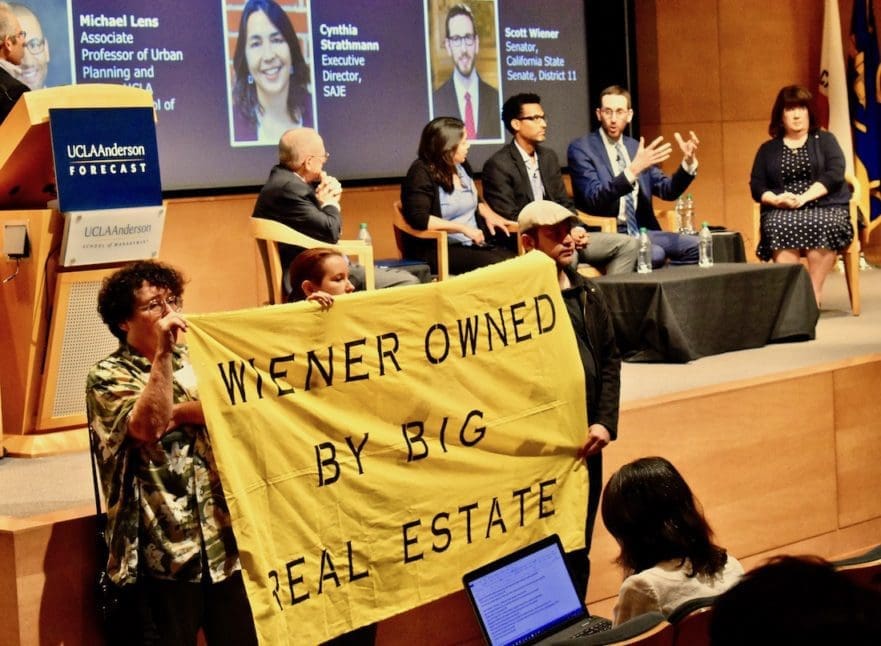Housing Is A Human Right has released today a special report about California State Sen. Scott Wiener’s troubling financial connections to the real estate industry. It reveals that Wiener — who aggressively pushes a controversial “trickle-down” housing agenda that fuels gentrification — has long relied on vast amounts of campaign cash from developers and other real estate insiders to win elections and stay in power. His most recent bill, SB 50, can generate billions for his political patrons.
Part I: “Wiener Owned By Big Real Estate”
On another sunny Wednesday in Los Angeles, in June of last year, Scott Wiener, the bearded, bespectacled, wonkish California state senator who had become the darling of supply-side liberals and the real estate industry, was caught off guard. From his seat on stage at Korn Convocation Hall at UCLA, the kind of privileged setting that’s usually a safe haven for Wiener, he watched three housing activists quietly approach him, unfurling a large, yellow banner only a few feet to his right. Wiener couldn’t see the spray-painted message on the front, but he sensed what was written wasn’t flattering.
“Democracy in action,” Wiener told the audience at a panel discussion titled “The Best of Times and the Worst of Times for Housing.” “So people can have their opinion.”
Wiener, sitting upright in an unbuttoned gray suit, kept glancing over at the activists — one man and two women, standing silently. He was attempting to answer a question from Stuart Gabriel, director of the UCLA Richard S. Ziman Center for Real Estate and board member of development giant KB Home. Gabriel, who had just praised Wiener’s controversial housing policies as “spectacular,” and whose center receives significant annual funding from real estate titans such as developer Jeffrey Worthe, landlord Tod Spieker, and developer Nelson Rising, wanted the state senator to share the driving philosophy behind his aggressive brand of legislating.
Wiener, a 48-year-old, Ivy League-educated Democrat who represents San Francisco, had been anointed, by sympathetic journalists and academics like Gabriel, as something of a visionary last year. It happened when he introduced SB 827, a real estate deregulation bill that new urbanists and the real estate industry wholeheartedly embraced, but was vigorously opposed by a broad coalition of housing and social justice groups.
Activists said SB 827 was just another trickle-down, luxury-housing bill that would worsen an already devastating wave of gentrification and displacement in California cities — and did virtually nothing to urgently address a statewide housing affordability crisis. Much of the academic elite and mainstream media, many of whom champion a “build, baby, build” agenda pushed by politicians and developers, swept aside the activists’ valid concerns. But the grassroots mustered enough sway to stop the legislation in April 2018.
The three activists with the banner were not so entranced by Wiener — and showed no signs of leaving. The state senator struggled, at first, to find his mental footing. But the thrust of his lengthy, seven-minute reply to Gabriel seemed sensible: California was suffering from a major housing shortage, more housing needed to be built, and that new housing should be located at transit stops. “We need to be strategic and say that housing needs to be near where people work and accessible to public transportation,” Wiener explained.
But the state senator wanted to build luxury housing — for an ongoing housing affordability crisis. And he cared little, if at all, that middle- and working-class residents, who can’t afford luxury housing, would be hurt by gentrification and displacement as those luxury housing complexes were built.
What was most telling were the things Wiener didn’t include in his answer to Gabriel. Incredibly, as a self-appointed housing expert, in a state where housing affordability and homeless crises are slamming millions of middle- and working-class Californians, such words as “gentrification,” “displacement,” “housing affordability crisis,” “homeless crisis,” and “tenant protections” never passed Wiener’s lips. Why? The activists holding the yellow banner supplied their answer in big, black, capital letters: WIENER OWNED BY BIG REAL ESTATE.
Largely unreported by the media, Wiener, a one-time San Francisco supervisor, has always relied on campaign contributions from the real estate industry — landlords, developers, real estate attorneys, property management firms, brokers, architects, among others — to get elected and stay in power. That’s particularly true for his seat in the California State Senate. In 2016, he hauled in nearly 700 donations from Big Real Estate totaling $574,276, according to state records reviewed by Housing Is A Human Right. That campaign cash helped Wiener squeak by his underdog opponent, Jane Kim. As a result, he’s indebted to the real estate industry, and he’s been relentlessly pushing housing policies, specifically SB 827 and its troubling 2019 reboot, SB 50, that can generate billions for an array of real estate players who are his political patrons.
(See the full list of Wiener’s 2016 real estate campaign contributors — and the full list of his 2020 real estate contributors.)
By any measure, Wiener is what The Nation magazine termed a “corporate Democrat.”
“There’s a shadow over California politics,” The Nation reported in 2016. “When the corporations’ favorite political party became hopelessly weak, they set out to gain power in the other one. Their tool, of course, was money. So now we have some Democrats taking corporate money and doing the bidding of the oil and gas industry, agribusiness, the real estate developers, Big Pharma, and some of the billionaires.”
Wiener, in fact, hasn’t only done the bidding of Big Real Estate. As a powerful state senator who eagerly introduces one bill after another, he’s launched legislation that can enrich his other campaign contributors: bar and nightclub owners, beverage conglomerate Anheuser-Busch, pharmaceutical giant Gilead Sciences, and the solar industry.
Only days before Wiener introduced bill SB 288, which supposedly allows customers to more easily install solar panels, the solar industry, including the Solar Energy Industries Association California PAC and solar installer Petersen Dean, flooded the state senator’s 2020 re-election campaign between February 2 and February 8 of 2019 with 14 checks totaling $9,150, according to state records. Curiously, 11 of the 14 contributions were the same amount: $750.
Through the California Public Records Act, Housing Is A Human Right (HHR) sought a deeper understanding of the relationships between Wiener and his campaign contributors. HHR requested Wiener’s work schedule for the past several months as well as emails between the state senator and campaign contributors. The state senate rules committee responded that such records are “exempt from mandatory production.” HHR asked Wiener’s chief of staff, Krista Pfefferkorn, if the state senator would provide them anyway. She did not reply. In Los Angeles, the largest city in California, council members and the mayor routinely hand over emails and work schedules when requested through the public records act.
On October 21, 2016, at the height of Wiener’s contentious campaign for the state senate, the San Francisco Tenants Union (SFTU) released a strongly worded press release titled “Tenants Union Outraged by Scott Wiener’s Misleading Mail.” The advocacy group was livid that Wiener had “mislead voters on his record on tenants’ rights” and “misuses” the words of former SFTU executive director Ted Gullickson, who had passed away and couldn’t speak up.
“I am appalled by this mail piece,” said Deepa Varma of SFTU. “It tarnishes the legacy of Ted, a man who spent decades fighting for tenants’ rights and fighting politicians like Scott Wiener. Scott Wiener’s record on the [San Francisco] Board of Supervisors has shown him to be a tool of the landlords, big realtors, and special interests.”
A little more than two years into his first term as state senator, Wiener has shown no signs of redemption. If anything, he’s expanded the base of real estate contributors that he carefully cultivated as a local official in San Francisco, raking in even more campaign cash to maintain, and grow, his power — so far, for his 2020 reelection bid, Wiener has hauled in a prodigious $153,816 from the real estate industry. But since he’s now a brazen legislator in Sacramento, the entire state of California may suffer the life-altering consequences of Wiener’s political paybacks to Big Real Estate.

Part II: An Appalling Legacy
When Scott Wiener ran, in 2010, for San Francisco supervisor in District 8, he was hardly a candidate to get excited about — unless you were a real estate hotshot. It was a time when African Americans were getting shoved out of San Francisco at a disproportionately greater rate than other ethnicities; a six-year, upward trend of evictions started slamming the city’s renters (from 1,372 in 2010 to 2,304 in 2015); and San Francisco was ranked the fifth most expensive metropolis in the entire nation. But Wiener, a 40-year-old deputy city attorney who ran as an openly gay candidate in a heavily LGBT district, didn’t showcase gentrification, tenant protections, or affordability issues on the campaign trail. Instead, he talked about the “basics” of government.
For a campaign video, which essentially laid out the key planks of his “basics” platform, Wiener explained that he was keen on fixing public transportation (“Like moving away from cash fares so we can speed up the boarding process and having better spacing of bus stops”); updating the San Francisco Police Department (“Supporting Chief Gascon’s modernization of the department’s technology, the way it investigates crimes, and so forth”); and creating more jobs (“Having City Hall be a tool to help attract businesses”). That last quote was a revealing glimpse into Wiener’s political priorities — rather than emphasize that government could help people, he went the other way and held up business.
The professional class, particularly those in the influential real estate industry, thought they had a winner. They started pumping sizable checks into his campaign coffers.
“While [Rafael] Mandelman is labor’s candidate for District 8,” wrote Paul Hogarth for Beyond Chron, a San Francisco news site, in 2010, “Scott Wiener is clearly the favorite of landlords and real estate interests. A Beyond Chron review of Wiener’s filings for this quarter counted $6,175 from donors who listed ‘realtor’ (or something similar) as their occupation, $6,225 from landlords or property managers, and $2,275 from developers. If anything, these figures underestimate his real estate money — because many landlords put ‘retired’ or ‘self-employed’ as their occupations. Notable Wiener donors included Senator Dianne Feinstein, Pacific Heights fundraisers Mark and Susie Tompkins Buell, angel investors Ron and Gayle Conway, and landlord advocates Janan New and David Fix.”
By 2010, Wiener, who grew up in a New Jersey suburb outside Philadelphia, had lived in San Francisco for 13 years. He had graduated the elite Duke University in 1992 and the even more elite Harvard Law School in 1996. Within a year, in 1997, he was working in San Francisco as a litigation attorney for the international law firm Heller Ehrman White & McAuliffe, which represented such big businesses as Levi Strauss, Consolidated Foods, McDonald’s Corporation, and Northrop Grumman Corporation. Wiener moved to the San Francisco City Attorney’s Office in 2002. Associates, according to the news site SFGate, routinely described him as “hard-working.”
Yet housing activists were uneasy about exactly who Wiener would work hard for. Just before Election Day, it was revealed that San Francisco multi-millionaire real estate investor Thomas Coates, who had shelled out nearly $1 million to an unsuccessful 2008 statewide ballot measure that would have phased out rent control in California, delivered $10,000 in campaign cash to an independent expenditure committee that backed Wiener and at least $200,000 to other “moderate” candidates for the board of supervisors. (In San Francisco, elected officials, who are usually Democrats, are often referred to as either “progressive” or “moderate.” In 2018, the San Francisco Public Press rated Wiener as “the most moderate, or right-leaning” among all the city’s present-day politicians.)
San Francisco Democratic Party Chairman Aaron Peskin, who would later be rated the “most progressive, or left-leaning” member of the board of supervisors, told SFGate that Coates’ hefty contributions “threaten all San Franciscans who think elections shouldn’t be for sale.” Wiener defeated Rafael Mandelman by 2,383 votes.
In 2014, Wiener was re-elected to the board of supervisors, with even more enthusiastic backing from the real estate industry. The San Francisco Apartment Association, infamous landlord Russell Flynn, real estate investor Thomas Coates (once again), and all sorts of developers, realtors, and real estate players whipped out their checkbooks for Wiener. The Anti-Eviction Mapping Project, based in San Francisco, found that the real estate industry had contributed an eye-popping 41 percent of all campaign monies to Wiener’s 2014 re-election bid.
Several of those contributors included shady property owners known for mass evictions and harassing tenants. “Wiener’s district is part of ground zero for the Ellis Act,” reported the Anti-Eviction Mapping Project, referring to the controversial state law that allows a developer or landlord to evict tenants in an apartment building and then turn the property into a condo complex or boutique hotel. In effect, the law turns affordable housing into luxury housing.
Between 2011 and 2016, Wiener’s entire time as a supervisor, the Anti-Eviction Mapping Project found that 1,054 Ellis Act evictions took place in San Francisco. With an average household size of 2.3 persons, that’s roughly 2,424 people who were kicked out of their apartments to make way for luxury accommodations. Activists decried that a massive gentrification crisis was sweeping through the city.
“San Francisco’s gentrification has reached a ridiculous new extreme,” Causa Justa :: Just Cause, a Bay Area social justice group, wrote in 2014, “making it the most expensive city in the country, outstripping even Manhattan, the home of Wall Street and its corporate tycoons.”
Even the New York Times took note of San Francisco’s gentrification crisis, which was severely impacting the African American community. In a 2016 article, titled “The Loneliness of Being Black in San Francisco,” the Times reported that the “decline [of the African American population] has been steady and noticeable. One of seven residents was black in 1970. Today, it is nearly one of 20, with most of the city’s 46,000 blacks living in public housing.”
The Times further reported: “The reasons for the [African American] migration are in large measure economic: Skyrocketing real estate prices fueled by high-paying tech jobs have priced out middle-class residents of all ethnicities. But the exodus was also accelerated by a domino effect of black businesses and families moving away, many of them to Oakland and other cities along the East Bay.”
Yet Wiener didn’t go against his political patrons in Big Real Estate and advance strong anti-gentrification measures that could hurt their sizable profits. He also didn’t aggressively lobby state legislators to repeal the Ellis Act — a law that housing activists widely consider an insidious tool to gentrify middle- and working-class neighborhoods.
Instead, Wiener proposed an ordinance backed by the real estate industry that would have turned 2,000 rent-controlled units into luxury condominiums. He was also one of only two supervisors who opposed, in 2016, legislation that increased the number of the affordable housing units a developer must include in a new project — the kind of policy developers detest. “The market should be accountable to building more affordable and middle income housing and not just luxury housing,” explained San Francisco Supervisor Jane Kim.
Wiener, the longtime beneficiary of real estate campaign contributions who was already raising money from Big Real Estate for his upcoming 2016 state senate run, didn’t agree.
In addition, Wiener led the successful opposition of a 2016 “Tech Tax,” which activists supported but tech firms nixed, that could have generated $140 million annually to help build affordable housing and pay for homeless services. And he backed the victorious Proposition Q, which real estate investor and longtime Wiener contributor Thomas Coates and the tech industry funded, that further criminalized homelessness and allowed the city to clear homeless encampments. Such sweeps, advocates say, do nothing to deal with the root causes of homelessness.
John Burton, chairman of the California Democratic Party at the time, insisted that Proposition Q was only a “guise of solving a problem when it merely pushes it down the street or into other neighborhoods.” He added: “As a former elected official, one of the things that bothered me the most was elected officials who use the poor for their own political advancement.”
Wiener carried out the wishes of his campaign contributors in Big Real Estate and Big Tech — the tech industry is another major source of campaign cash for Wiener. But his refusal to increase funding for affordable housing and homeless services coupled with his backing for homeless sweeps would leave behind an appalling legacy.
In January 2018, the United Nations special rapporteur on adequate housing, Leilani Farha, toured San Francisco to investigate homelessness. She told the San Francisco Chronicle she was “completely shocked” by the conditions on the streets. Months later, in October 2018, she concluded in a report that San Francisco’s handling of its homeless was “cruel and inhuman treatment” and a “violation of multiple human rights.”
Apparently, Wiener didn’t care about that legacy. Around the same time that the U.N. released its findings, he opposed another San Francisco ballot measure, Proposition C, which the tech industry also tried to stop. It sought to tax the city’s largest businesses to create more money for homeless services. For this go-around, Wiener and Big Tech didn’t win — the initiative was overwhelmingly approved, with 60 percent of the vote.

Part III: A Corporate Democrat
In 2016, Scott Wiener, a moderate, found himself in an uncomfortably tight race against San Francisco Supervisor Jane Kim, a progressive, for the California State Senate. With tons of campaign cash from Big Real Estate, Big Tech, and other power players in San Francisco, Wiener was expected to blow Kim away. Instead, she won the June primary by a little less than 700 votes — and landed the endorsement of presidential candidate and U.S. Senator Bernie Sanders. Things were not going as planned — for Wiener or his corporate contributors.
For his state senate run, Wiener had been raking in money from the real estate industry since 2015. The California Apartment Association, a fierce opponent of rent control, placed an early $4,200 bet on Wiener in 2015. Landlord Russell Flynn also delivered a $4,200 campaign contribution that year. The San Francisco Apartment Association wrote a $4,200 check. Wiener was the real estate industry’s candidate.
In fact, Wiener’s campaign contribution records read like a “Who’s Who” directory of Big Real Estate: $4,000 from real estate broker Olga Howells; $4,200 from the Building Owners and Managers Association of San Francisco; $4,100 from the development company Build, Inc.; $4,200 from senior global real estate advisor Gregg Lynn of Sotheby’s International Realty; $4,200 from developer Alastair MacTaggart; $4,200 from real estate law firm Duane Morris; $8,500 from the California Association of Realtors. The list goes on. After the June shocker, the real estate industry pumped more cash into Wiener’s campaign coffers, totaling 693 contributions that added up to the hefty sum of $574,276.
(See the full list of Wiener’s 2016 real estate campaign contributors.)
That enormous cash infusion worked. By the end of October 2016, only a week before Election Day, Wiener had a 2-to-1 edge in campaign contributions over Kim — and he won the race by 8,146 votes. When he strode into the red-carpeted, Neoclassical chamber of the California State Senate for the first time, Wiener had the real estate industry to thank — and he owned big favors to the developers, landlords, real estate attorneys, architects, property managers, and real estate lobbyists who financed his new journey into high-profile, state politics.
Wiener moved quickly, introducing housing bills that advanced a “build, baby, build” agenda pushed by developers, who have conveniently argued, for years, that they’re tackling California’s “housing crisis.” But community activists knew that was political cover for what developers really coveted: lucrative land-use approvals from local officials for their massive luxury-housing complexes that would generate billions. Yet those upscale projects, regularly held up by local politicians as shiny examples of progress, dramatically changed the character of neighborhoods and, even worse, fueled gentrification and displacement in middle- and working-class communities. In the meantime, the true problem — a distressing lack of affordable housing — was only worsening.
In 2016, Zillow, the real estate site, found that in San Francisco, Los Angeles, and other major cities, “very high demand at the low end of the market is being met with more supply at the high end, an imbalance that will only contribute to growing affordability concerns for all renters.”
Zillow Chief Economist Dr. Svenja Gudell further stated: “Apartment construction at the low end needs to start ramping up, and soon, in order to see real improvement.”
Wiener ignored that, insisting that California needed “an enormous amount of new housing at all income levels.” He was pushing what activists call “trickle-down” housing: just build more housing, even if it’s luxury, and eventually rents for everyone will drop. Wiener’s trickle-down argument went directly against Zillow’s findings.
Even Richard Florida, an urban planning guru for politicians like Wiener, recently wrote that “the markets — and neighborhoods — for luxury and affordable housing are very different, and it is unlikely that any increases in high-end supply would trickle down to less advantaged groups.”
And there’s no guarantee that luxury housing will become cheaper in the future. According to the California Legislative Analyst’s Office, it will take some 25 years for the possibility that luxury housing will become affordable. In the end, activists believe trickle-down housing is another scheme for developers to haul in more billions — and Wiener, who’s so far raised $153,816 from the real estate industry for his 2020 re-election bid, is leading the legislative charge on their behalf.
Even more, the state senator’s housing policies advance government-sanctioned gentrification: politicians lure high-end developers into less affluent communities by handing over tax subsidies, zone changes, and other favors, and developers build luxury housing that middle- and working-class residents not only can’t afford, but also increases rents in the neighborhood and ultimately pushes them out.
“The policies that cause cities to gentrify are crafted in the offices of real estate moguls and in the halls of city government,” author Peter Moskowitz writes in his well-regarded book How to Kill A City: Gentrification, Inequality, and the Fight for the Neighborhood. “The coffee shop is the tip of the iceberg.”
In early 2018, Wiener introduced SB 827, a real estate deregulation bill that would have allowed developers to more easily build dense luxury housing near transit stops. The legislation was killed by a coalition of social and housing justice groups. They believed SB 827 — a shameless example of government-sanctioned gentrification — would give upscale developers free rein to construct luxury-housing complexes in middle- and working-class communities, forcing residents out of their longtime neighborhoods.
“SB 827 would handcuff local government from addressing its particular affordable housing needs and result in imposing regulations that will increase displacement and gentrification,” wrote Larry Gross, executive director of the Los Angeles-based Coalition for Economic Survival, in March 2018.
Wiener is back with a reboot of SB 827, now called SB 50. He’s conceded that it’s essentially the same bill, but with temporary protections for “sensitive communities” under threat of gentrification. Activists point out, however, that once those temporary protections are gone, developers will quickly swoop in. Interestingly, the fact that Wiener has to include protections is an acknowledgment that SB 50 will fuel gentrification. SB 50 is co-sponsored by California YIMBY, a controversial organization that also pushes trickle-down housing policies. California YIMBY and Wiener have something else in common: Big Tech shells out major funding to both of them.
Wiener lives up to his label as a “corporate Democrat” as he rolls out legislation that not only benefits the real estate industry, but also other big-time campaign contributors.
In addition to introducing a bill that would generate spectacular revenue for his political patrons in the solar industry, Wiener recently advanced legislation, in January 2019, that would allow people to obtain HIV-prevention pills without a doctor’s prescription, even though the Centers for Disease Control and Prevention (CDC) strongly recommends doctor consultations. The pharmaceutical giant Gilead Sciences, which manufactures Truvada, an HIV-prevention drug that can cause serious side effects, shelled out $8,800 to Wiener’s 2020 re-election campaign, including a $4,400 contribution on October 25, 2018. Truvada generated $3 billion in revenue for Gilead last year, and the company is now embroiled in a patent dispute with the CDC.
Wiener also put forward a bill, in December 2018, that would allow bars in San Francisco and other select cities in California to push back closing time to 4 a.m. Former Governor Jerry Brown had vetoed a previous version of the legislation, explaining that the “California Highway Patrol strongly believes increased drinking will lead to more drunk driving.” Wiener didn’t listen, and re-introduced the bill a few months later — he’s raked in thousands in campaign cash from bar and nightclub owners, including a total of $8,800 from the “King of Beers,” Anheuser-Busch Companies, for Wiener’s 2020 re-election bid. In fact, the brewer delivered a $4,400 contribution on December 6, 2018. Eleven days later, Wiener officially revived the bar closing bill. With longer bar hours, Anheuser-Busch will sell more beer — and make bigger profits.
The timing of the campaign contributions to Wiener is suspiciously similar to what’s been happening in Los Angeles. Developers and L.A. politicians have long engaged in a “pay-to-play” culture, in which developers seeking lucrative zone changes to build upscale housing complexes hand over campaign contributions to L.A. City Council members and the mayor. The politicians, in return, deliver the zoning favors. The FBI is now investigating an L.A. councilman, developers, and several city officials for corruption.
(Read the Housing Is A Human Right investigative report “The Garcetti-fication of Los Angeles: A Gentrification Cautionary Tale.”)
With the real estate industry shelling out more than $725,000 to his 2016 and 2020 campaigns for the state senate, Wiener was faced with the awkward prospect of publicly backing Proposition 10. The 2018 ballot measure sought to repeal statewide rent control restrictions as Californians struggled with skyrocketing rents and an escalating housing affordability crisis. The Nation magazine showcased Prop 10 as one of the 10 “more vital” progressive battles in the country. Also, more than 525 social justice groups, housing justice and tenants rights organizations, political leaders, and many others endorsed Prop 10, including the California Democratic Party, the Sierra Club, the California Labor Federation, the California Teachers Association, the ACLU, and U.S. Senator Bernie Sanders.
(See the full list of Wiener’s 2020 real estate campaign contributors.)
What did Wiener, a San Francisco Democrat, do? He refused to endorse, and sat on the sidelines while excessive rents devastated middle- and working-class Californians. Wiener’s real estate contributors, including Build, Inc., the California Association of Realtors, and the California Building Industry Association, had shelled out $9.9 million to stop Prop 10. The real estate industry as a whole raised $77.3 to shoot down the measure — and won. (California YIMBY also failed to back Prop 10.)
Only a month after Prop 10 was defeated, Wiener wasted no time — he introduced his rebooted trickle-down housing bill, SB 50. The sweeping legislation, which housing activists still fear will exacerbate a statewide gentrification crisis, can generate billions for luxury-housing developers, real estate attorneys, landlords, architects, and other real estate players throughout California. Wiener’s well-heeled real estate contributors were no doubt pleased.

Part IV: The Company He Keeps
For nearly 10 years, Scott Wiener, as San Francisco supervisor and now state senator, has relied on vast amounts of campaign cash from the real estate industry to win elected office and keep a white-knuckled grip on power. The list of real estate honchos who back Wiener is long and eye-opening.
For his 2014 re-election campaign for supervisor, Wiener received, to only name a few, $500 from David Gruber, owner of Gruber & Gruber Properties; $500 from landlord Russell Flynn; $500 from Louis Vasquez, founding partner of Build, Inc.; $500 from Greg Vilkin, president of MacFarlane Partners; $500 from architect Charles Bloszies; $500 from real estate broker Al Clifford; and $500 from attorney James Reuben of the land-use law firm Reuben, Junius & Rose.
For his 2016 and 2020 state senate campaigns, Wiener hauled in $4,200 from Veritas Investments; $1,000 from public affairs consultant Sam Lauter, whose firm represents developers; another $4,200 from land-use law firm Reuben, Junius & Rose; $1,000 from Ground Floor Public Affairs, which also represents developers; $4,200 from real estate investor and rent control opponent Thomas Coates; $4,200 from real estate broker Jesse Fowler of Paragon Real Estate Group; and, among hundreds of others, another $4,400 from landlord Russell Flynn.
Flynn is an exceptionally notorious contributor of Wiener’s. Widely considered a predatory landlord, Flynn, a multi-millionaire, built his real estate empire in the Bay Area by purchasing rent-controlled apartment buildings and then forcing longtime tenants out through harassment and other sketchy methods. When those tenants left, he could legally raise the rent to market-rate, charging new residents top dollar. Flynn has consistently delivered campaign cash to Wiener going back to his 2010 run for San Francisco supervisor.
It brings to mind a saying credited to the ancient Greek fabulist Aesop. He wrote: “A man is known by the company he keeps.”
About the author: This report was researched and written by Patrick Range McDonald, special investigator for Housing Is A Human Right. McDonald was an award-winning investigative journalist at L.A. Weekly. He received the “Journalist of the Year” award from the Los Angeles Press Club and the national “Public Service” award from the Association of Alternative Newsmedia, among other honors.

